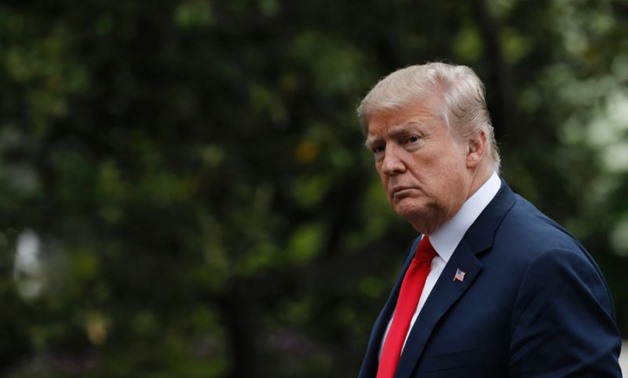
US President Donald Trump will unveil his decision on Iran on Tuesday - AFP
8 May 2018: President Donald Trump was poised Tuesday to pull the United States out of the Iran nuclear deal, reimposing sanctions and abandoning the 2015 accord that Washington's allies believe is the last barrier against a Middle East arms race.
A US government official told AFP that Trump intends to announce he is dropping Washington's commitments under the deal, in defiance of desperate calls from European capitals for more time to negotiate a "Plan B."
Trump, who has long pledged to tear up the "very badly negotiated" agreement, was due to speak at 2:00 pm at the White House, and some deal supporters are clinging to hopes he might only partially reinstate sanctions or allow more time for talks.
Instead, it now seems more likely that he will effectively tear up the accord -- which his predecessor Barack Obama agreed with Britain, China, France, Germany and Russia -- and dare Tehran's regime to restart its enrichment program and alleged quest for a nuclear weapon.
Former Obama administration officials said this would put Washington on a collision course with Iran, distance the White House from its key allies, put US citizens held in Iran at risk, undermine efforts to negotiate away North Korea's nuclear arsenal and threaten new conflict in the Middle East.
Former deputy secretary of state Tony Blinken, who helped negotiate the accord, said this would be a "monumental mistake" and former senior diplomat Wendy Sherman told reporters Trump was putting international stability at risk for purely domestic political purposes.
"This has been a crisis that Trump has been precipitating himself to answer his base, to fulfil a campaign pledge that he made, without any sense whatsoever of what Plan B is," she told reporters.
"It says that the United States is not a reliable partner," she added, insisting that the existing deal permanently prevents Iran from gaining a nuclear weapon.
Blinken said ending the deal gives "hardliners in Iran an excuse to restart their pursuit of nuclear weapons, but without the united international coalition to oppose them or inspectors on the ground to expose them."
Trump had had until May 12 to decide whether to continue to waive sanctions on Iran's central bank and its oil sector dealings, a key pillar of the 2015 agreement.
- Somber mood -
For months, critics have been warning ending the waivers would unravel the carefully constructed deal, plunge Iran's already struggling economy into crisis and expose the biggest transatlantic rift since the Iraq War.
But some US officials close to Trump, as well as hawkish Washington lobbyists, argue that an Iranian economic collapse could lead to Tehran's Islamist regime falling -- and that this would be a good thing.
The president's decision will be closely watched across the Middle East, where a number of powers are mulling their own nuclear programs, and in Pyongyang ahead of non-proliferation talks between Trump and North Korean leader Kim Jong Un.
For months, Trump has unsuccessfully demanded changes to the Obama-era nuclear accord, which saw Iran stop military-scale uranium enrichment and open up to inspections, in return for massive sanctions relief.
Months of intensive talks with European allies ultimately stalled when Berlin, London and Paris refused Trump's demand to rewrite key provisions of the accord.
One European diplomat, echoing the somber mood around foreign embassies in Washington on the eve of Trump's announcement, said "there is plainly a difference of opinion."
"I would like to pretend to you today that I feel that there is a chance of the existing (deal) remaining intact," the European official said. "I think that that chance may exist but it is very small."
A French official said Macron left the United States last week "convinced that we would get a negative decision."
- Danger of 'escalation' -
Ahead of Trump's verdict, diplomats shifted into damage limitation mode, hoping that beyond his inevitably harsh rhetoric, he stops short of immediately reimposing sanctions.
In Brussels, officials are already working on "blocking" measures that would protect EU citizens and companies from US prosecution.
"We are having conversations obviously and we are working on a number of proposals that could protect European companies and operators," a senior EU official told reporters.
Tehran has sent mixed signals about its potential response, hinting it could leave a fatally undermined deal and resume military-scale uranium enrichment.
But Iranian President Hassan Rouhani -- who publicly backed engagement with the United States and could face a domestic backlash if that policy fails -- indicated his country would stay in the agreement even if Washington pulls out.
It is still unclear whether Iran's more hardline military leaders, or Supreme Leader Ayatollah Ali Khamenei, hold the same view.
Iran staying in the deal makes it more likely that vital avenues for European trade would stay open.
Amid six months of speculation over Trump's decision, the Iranian rial had lost around a third of its value, before authorities in April took the drastic step of pegging the exchange rate to the dollar.

Comments
Leave a Comment